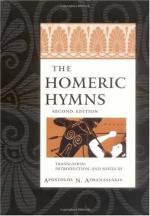Then, smiling, Apollo, the son of Zeus, spoke to them:
“Foolish ones, enduring hearts, who desire cares, and sore toil, and all straits! A light word will I speak to you, do ye consider it. Let each one of you, knife in right hand, be ever slaughtering sheep that in abundance shall ever be yours, all the flocks that the renowned tribes of men bring hither to me. Yours it is to guard my temple, and receive the tribes of men that gather hither, doing, above all, as my will enjoins. But if any vain word be spoken, or vain deed wrought, or violence after the manner of mortal men, then shall others be your masters, and hold you in thraldom for ever. {133} I have spoken all, do thou keep it in thy heart.”
Even so, fare thou well, son of Zeus and Leto, but I shall remember both thee and another song.
II. HERMES
Of Hermes sing, O Muse, the son of Zeus and Maia, Lord of Cyllene, and Arcadia rich in sheep, the fortune-bearing Herald of the Gods, him whom Maia bore, the fair-tressed nymph, that lay in the arms of Zeus; a shamefaced nymph was she, shunning the assembly of the blessed Gods, dwelling within a shadowy cave. Therein was Cronion wont to embrace the fair-tressed nymph in the deep of night, when sweet sleep held white-armed Hera, the immortal Gods knowing it not, nor mortal men.
But when the mind of great Zeus was fulfilled, and over her the tenth moon stood in the sky, the babe was born to light, and all was made manifest; yea, then she bore a child of many a wile and cunning counsel, a robber, a driver of the kine, a captain of raiders, a watcher of the night, a thief of the gates, who soon should show forth deeds renowned among the deathless Gods. Born in the dawn, by midday well he harped, and in the evening stole the cattle of Apollo the Far-darter, on that fourth day of the month wherein lady Maia bore him. Who, when he leaped from the immortal knees of his mother, lay not long in the sacred cradle, but sped forth to seek the cattle of Apollo, crossing the threshold of the high-roofed cave. There found he a tortoise, and won endless delight, for lo, it was Hermes that first made of the tortoise a minstrel. The creature met him at the outer door, as she fed on the rich grass in front of the dwelling, waddling along, at sight whereof the luck-bringing son of Zeus laughed, and straightway spoke, saying:
“Lo, a lucky omen for me, not by me to be mocked! Hail, darling and dancer, friend of the feast, welcome art thou! whence gatst thou the gay garment, a speckled shell, thou, a mountain-dwelling tortoise? Nay, I will carry thee within, and a boon shalt thou be to me, not by me to be scorned, nay, thou shalt first serve my turn. Best it is to bide at home, since danger is abroad. Living shalt thou be a spell against ill witchery, and dead, then a right sweet music-maker.”
[Hermes making the lyre. Bronze relief in the British Museum (Fourth Century B.C.): lang136.jpg]




